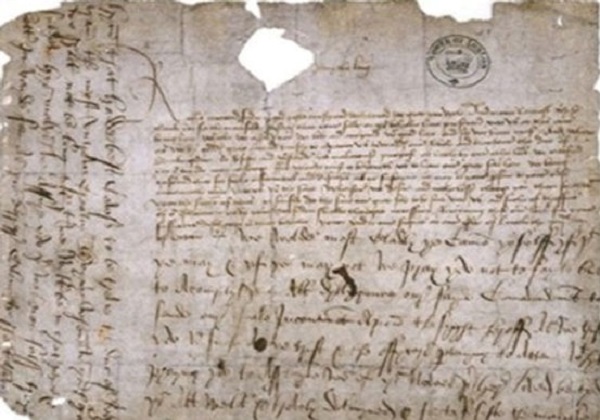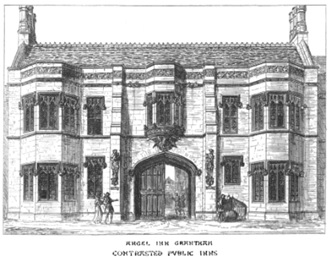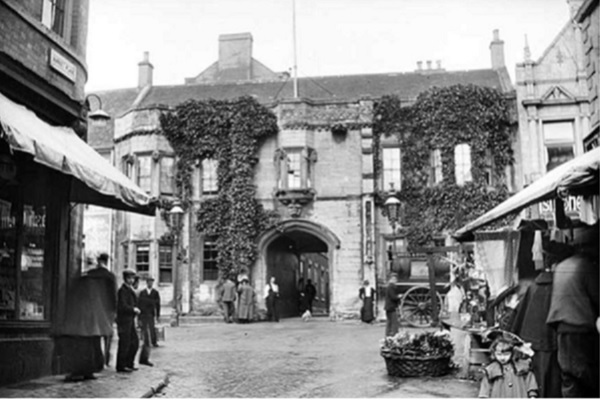The Angel Inn, Grantham and the Great North Road
Grantham has been a stopping off point for those travelling north and south for a millennium. It sits close to Ermine Street Roman road, and it is firmly on the route which became the Great North Road of the coaching era.
The Angel Inn traces its roots back to a hostel built in 1203 by the Knights Templar; this was a military/religious order which supported those fighting the Crusades or choosing to visit the Holy Land as pilgrims. By the 14th century the site was being operated as an inn, attracting a succession of high-profile visitors.
Development of postal services and the coaching trade brought a dramatic increase in the demand for inns and stabling. The Angel Inn handled the post for Grantham from the 16th century to the early 19th century. The postmaster in 1642 was Richard Leeming, the tenant of the Angel Inn and Alderman in 1666. He was appointed to serve ‘the King’s through post at Grantham’ at a salary of 1s 8d a day.
The Angel Inn was significantly extended in the late 18th century after it was purchased by the Cust family. By this time there were coaches to “York, Newcastle, Edinburgh, Scarborough, Whitby, Carlisle and all parts of the north”. Other inns in Grantham also prospered. The leading hostelries included the White Lyon, Red Lyon, the Crown and the George. In 1686 a War Office return recorded 285 guest beds in the town and stabling for 351 horses. By 1756 Grantham boasted 40 inns and victuallers.
The Angel was permitted extended licencing hours, remaining open as long as they wished until every bed was filled (rather than the normal 4am to 10pm!). In 1706, when Michael Soloman (the Angel’s landlord) died, he left a legacy of 40s a year to be paid for the preaching of an annual sermon against the evils of drunkenness each Michaelmas Day.

Image Credit- – Rex Gibson
About the Angel Inn, Grantham
As with many old inns it is tricky to verify which historic claims are true and which are part of the mythology elaborated to inform and attract customers over the centuries. A suggestion that the Angel in Grantham is the country’s oldest surviving inn is simply wrong though it might be possible to claim it as Britain’s oldest surviving coaching inn.
First the fabric of the building. The Historic England listing dates the 2-storey structure fronting the street to the late 14th century. Windows have been updated but the medieval façade is little changed with a central arch leading to the yard behind; at the crown of the arch is a striking corbel in the form of an angel, with an oriel window above. There were major renovations and extensions in the 18th century. These included a large internal staircase, and large 3 and 4-storey ranges to the north and south of the yard at the rear.
There have been many Royal visitors over the centuries. King John held court at Grantham in February 1213: this might well have been at the earlier hostel on the same site as the current hotel.
In the 14th century the Angel was visited by Edward III and his wife, Philippa of Hainault; their visit is commemorated by two stone corbels above the entrance.
In October 1483 Richard III held court at the inn and sent a letter requesting for the Great Seal to issue the death warrant against his rebellious cousin, Henry Stafford, 2nd Duke of Buckingham. A copy of the letter is displayed in the hotel’s dining room, known for centuries as La Chambre du Roi.


The “Chambre de’ Roi” or King’s Room – Bay window with ornate stonework. Image Credit – Rex Gibson
Charles I is known to have stayed in May 1633, and in 1643 Oliver Cromwell quartered troops at the inn following his victory at the battle of Gonerby Moor.
During the 19th century, George IV stayed at the inn on several occasions and Edward VII visited in 1866 during his time as Prince of Wales. It was following this last visit that the suffix “Royal” was added to the inn’s name (it is now known as the The Angel and Royal Hotel).

Image credit: Rex Gibson
The Angel Inn did not follow the pattern of decline experienced by other coaching inns after the demise of the coaching services in the mid 19th century. A strong railway connection, royal patronage and the ability to host members (and horses) of the Belvoir Hunt all helped in this regard.

In the 1830s Pugin contrasted the medieval features of the Angel at Grantham with the more modern (less attractive) features of a similar hotel in Oxford

